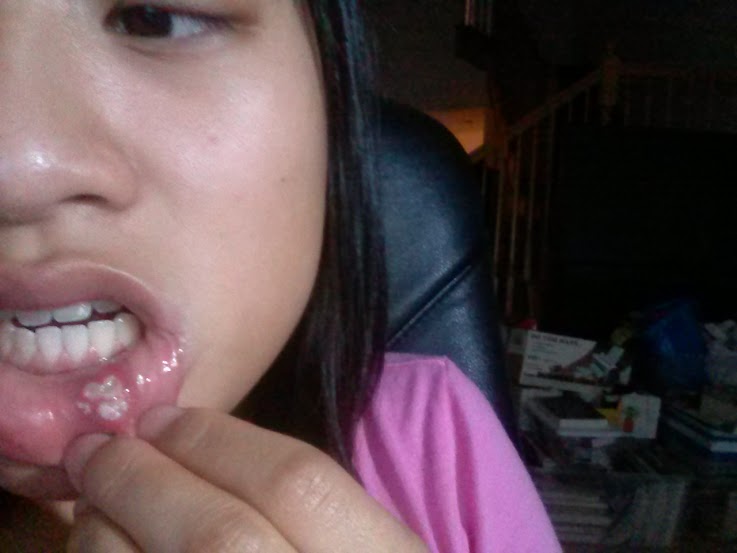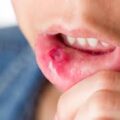What are canker sores?
Canker sores or aphthous ulcers are small, shallow ulcers that occur in the lining of your mouth. A canker sore starts as a white or yellowish mouth sore with a red border. They’re usually very small (less than 1 millimeter) but may grow to 1/2 inch to 1 inch in diameter.
You can get canker sores on your tongue, gums, the roof of your mouth, inside of your lip, or under your tongue. They can be painful and often make eating and talking uncomfortable.
Most canker sores are round or oval with a white or yellow center and a red border. They form inside your mouth — on or under your tongue, inside your cheeks or lips, at the base of your gums, or on your soft palate. You might notice a tingling or burning sensation a day or two before the sores actually appear.
There are several types of canker sores, including simple, major, and herpetiform sores.
Simple canker sores
Simple canker sores are the most common and:
- Are usually small
- Are oval-shaped with a red edge
- Heal without scarring in one to two weeks
Major canker sores
Major canker sores are less common and:
- Are larger and deeper than minor canker sores
- Are usually round with defined borders, but may have irregular edges when very large
- Can be extremely painful
- It may take up to six weeks to heal and can leave extensive scarring
Herpetiform canker sores
Herpetiform canker sores are uncommon and usually develop later in life, but they’re not caused by herpes virus infection. These canker sores:
- Are pinpoint size
- Often occur in clusters of 10 to 100 sores, but may merge into one large ulcer
- Have irregular edges
- Heal without scarring in one to two weeks
Causes
No one knows what causes canker sores. They may be caused by a virus, maybe a form of an allergic reaction, or may result from an auto-immune condition (meaning that the body has developed an immune reaction against its own tissue). Some people have also found eating citrus fruit and other acidic foods increases the occurrence of canker sores, but this has not been scientifically proven.
Factors that may trigger these sores (without actually causing them) are injury or irritation (e.g., from dentures or sharp teeth), smoking, stress, a diet lacking in vitamin B12, folic acid, or iron, and the onset of menstruation for some women.
What is the white stuff in a canker sore?
Canker sores are characterized by a shallow ulcer with a whitish or yellow base surrounded by a reddish border. The white stuff in a canker sore contains a mixture of WBCs (white blood cells) and bacteria and some other fluids. The sores may occur singly or in groups and vary from about 1/8 inch to 1 -1/4 inch in diameter. The sore may be painful for three or four days, but complete healing usually takes ten to fifteen days. Canker sores may recur many times each year.
How to get rid of canker sores
Nothing cures canker sores or prevents recurrence. There are, however, ways to ease discomfort during the 3-4 days when the sores are painful and also prevent infection.
To prevent discomfort, try to avoid irritation from abrasive or spicy foods and use care not to irritate the sore while brushing your teeth. A gel such as benzocaine can also be used to numb the sore and ease the pain.
Cleansing antiseptic medications may prevent infection and promote healing. These medications can be used as rinses or gargling 3-4 times a day or as directed on the label. Many antiseptic and pain-relief medications may be purchased without a prescription. A few examples are:
- Hydrogen peroxide diluted with water to half-strength
- One tablespoon of salt and baking soda in four ounces of water
- Glyoxide (a non-prescription product)
- Wet tea bags held over the area
Vitamins may help in cases where a specific deficiency exists. In a study at the National Institute of Dental Research, half of the people with iron, folic acid, or vitamin B12 deficiencies responded favorably to supplementation while the other half showed no response.
If you experience canker sores very frequently, it may be helpful to get tested for allergies, because avoiding certain foods may minimize canker sores due to food allergies.
Avoid canker sores with these tips:
- Brush and floss after meals to keep your mouth clean and free of excess foods.
- Use a soft toothbrush to prevent irritation to your mouth and gums.
- Use orthodontic waxes to cover up any sharp edges on braces or other dental devices.
- Practice stress-reduction techniques, such as meditation.
- Keep a food diary. You may find connections between when canker sores appear and what you eat.
When to see a doctor about canker sores?
If the canker sore is unusually large, lasts 2 weeks or more, extends to the lips, makes it very difficult to eat or drink, or if you develop a fever, seek the advice of your primary care doctor, a dentist, or dermatologist.
Most people who get reoccurring canker sores will get them 2-3 times a year, on and off, starting by the time they’re 30 years old. But if you’re older and getting them for the first time, that may be an indication something else is going on, so you’ll want to seek medical advice.”





![How To Cure A Sore [Strep] Throat Fast](https://www.publichealth.com.ng/wp-content/uploads/2018/07/How-To-Cure-A-Sore-Strep-Throat-Fast-120x120.jpg)
